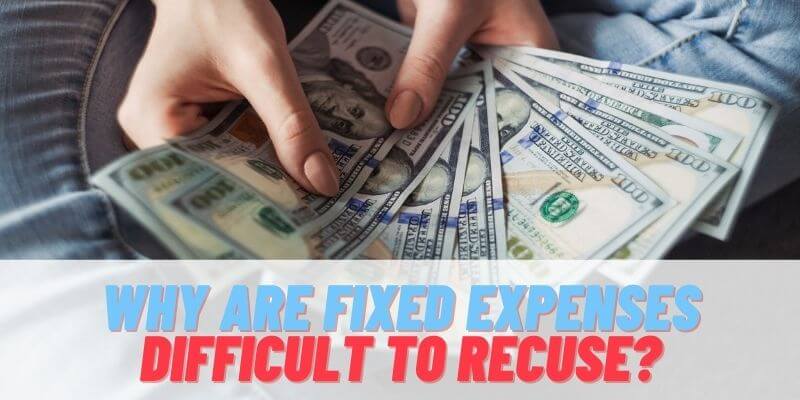Fixed expenses are the regular occurring costs. Many people wonder why are fixed expenses difficult to reduce, and this is what we want to help you today with.
They don’t change and cannot be avoided, and you need to pay for these expenses on a monthly or yearly basis.
Some of them include:
- Utilities
- Rent
- Insurance
- Car payments
- Mortgage payments
- Cable bills.
Most of the time, the term “fixed expenses” and “needs” are interchangeably used.
However, not all of your fixed expenses count your necessities. For example, these expenses could be subscription services or paid memberships.
It is easier to factor fixed expenses into your budget because they need to be paid regularly.
Variable expenses are easier to reduce as compared to fixed expenses. That’s because you don’t have to pay a fixed amount every month. While budgeting, you need to calculate your fixed expenses first.
Today you will learn why it is challenging to reduce fixed expenses and what you can do to manage your budget better.
So without further ado, let’s get to the details.
Quick Navigation
Reducing Fixed Expenses and Why it’s so hard to do?
Fixed Expenses vs. Variable expenses
Your budget can be divided into two parts:
- Fixed expenses
- Variable expenses
You need to understand these terms before you get into budgeting. This will enable you to better differentiate between your necessities and discretionary spending.
Let’s learn about each of these terms in detail.
Fixed Expense
A fixed expense is a cost that remains the same each month. It includes bills that need to be paid regularly and cannot be changed. You need to pay them on a weekly, monthly, quarterly, or annual basis.
Budgeting for fixed expenses is a lot easier than calculating variable expenses.
That’s because they are predictable and remain the same each month. Typically, the fixed expenses that a household has to bear each month include insurance premiums, rent payment or mortgage, car payment, real estate taxes, and more.
Since they are predetermined, fixed expenses are hard to reduce. You can refinance your loan or appeal property tax assessment to reduce your mortgage payment theoretically.
However, it isn’t as easy as it seems. The same is the case with rent payment.
You can move to a cheaper neighborhood or get a roommate. However, it requires significant lifestyle changes.
Life, car, health, home-owner, or renters rent fall under the same category. It requires hours of research to find alternate plans to switch to a more affordable payment plan.
This makes fixed costs harder to reduce when compared to variable expenses.
Variable Expenses
Variable expenses are not fixed amounts you need to pay regularly. They are discretionary spending.
These expenses could be anything from eating out, playing a round of golf with friends, buying new clothes, having Starbucks, and more.
These expenditures come under the variable expenses category because the amount you pay for them differs from month to month.
Not all variable costs are discretionary. Some of them represent necessities. For example, for most families, grocery spending is not the same each month.
Moreover, you may spend different amounts on fuel every month. Necessary car maintenance and repair also come under this category.
Why Is It More Difficult To Save On Fixed Expenses As Compared To Variable Expenses?
Fixed expenses are harder to reduce. They take more time to be adjusted. However, it is not altogether impossible to cut them.
For instance, you can look for more affordable housing if you want to reduce your rent payment.
However, it isn’t a choice you can make overnight. You need to wait until the end of your lease to move out.
In the meantime, you still need to pay the fixed rent cost until your lease ends.
On the contrary, variable expenses are easier to cut down. Most of them can be adjusted in a pinch.
For example, if you are faced with an emergency that leaves you short on cash, you cannot cut rent payments to meet your expenses for the month.
However, you can bring down your variable expenses to manage your monthly spending.
For example, you can be more mindful while shopping for groceries. You can avoid eat-outs and other recreational activities.
Items that aren’t your necessity can wait until you receive your next month’s paycheck.
If you are trying to save, you need to reduce your monthly expenditure. You need to reduce both your fixed and variable expenses.
Yes, you heard us right. It is possible to save money in either category. The process might be difficult for your fixed expenses. However, the outcomes will be worth the effort.
How To Reduce Your Fixed Expenses?

You need to reduce your fixed expenses if you are tired of living paycheck to paycheck.
You can fast-track your financial goals by doing so. Reducing your fixed expenses take more time, effort, and patience.
However, the results are far better as compared to cutting onetime expenses.
Managing fixed expenses helps your finances in the long-term. You can free-up months or even years of additional income by cutting down these expenses.
However, if you have never tried lowering your fixed costs, you may not know where to start.
Moreover, if you are not financially stable, it can be even harder to chop off your predetermined expenses.
Don’t fret! We will share some useful tips on how you can cut down your fixed expenses.
Ways To Reduce Your Fixed Expenses:
- Start Budgeting
You need to identify your fixed expenses before you try to reduce them. The best way to make that happen is to plan your budget on a piece of paper.
Make sure your written budget includes even the smallest of your expenses.
The best thing about writing down your budget is that you identify several unnecessary expenses.
You get to learn about the expenses that can be reduced or cut altogether. The entire process doesn’t even take 30 minutes of your day.
If you have never planned your budget before or haven’t had the greatest success, we recommend you to try various budgeting mobile apps available on app stores.
These applications are equipped with all those features you need to start budgeting like a pro.
Budgeting will give you an overview of all of your fixed expenses. Once you have them out in the open, you will realize some of these expenses aren’t even fixed.
This step will help you in cutting down these expenses confidently and precisely.
- Don’t overpay for insurance:
Once you have created your budget on a piece of paper and have identified your fixed expenses, you need to figure out the expense that makes the most sense to cut down.
Start with insurance. It includes everything from life, health, car, renter, and home-owner insurance.
Make sure you go through all kinds of insurance you are paying for. Sometimes you don’t even realize that you are paying too much for a type of insurance.
If you know that you are overpaying for insurance, you should look for different options.
While shopping for auto, home, or renter insurance, make sure you get quotes from multiple companies.
Search for as many options as possible. Once you know the rates and the aspects each insurance policy covers, it gets easier to compare insurance providers in terms of rate.
The best way to reduce your fixed expenses is to shop for better insurance rates.
- Cut the cord:
You may have to make some hard choices if you are trying to get out of debt. If you want to reduce your fixed expenses further, we will suggest you cut cable from your budget.
It is one of the easiest ways to reduce one of your fixed expenses. This tip can help you in two ways.
First of all, you can reduce your monthly expense by up to $60. Secondly, you save the hours and hours you waste sitting in front of the TV.
We understand that cutting cable may not be an option for the majority of households.
However, it is an effortless way to reduce monthly expenses for those who are trying to save.
You can easily squeeze in $50 – $60 into your monthly budget by cutting down the cable cost.
- Choose a cheaper cell phone plan:
It is hard to imagine a life without a cell phone today. However, that doesn’t mean you need to spend a pretty penny on your cell phone plan every month.
You can save a few extra bucks by calling your cell phone carrier. You can reduce your monthly fixed expenses by negotiating a better rate.
If that doesn’t work for you, you can always shop for a different carrier. Possibilities are, they may charge you lesser than your existing network for the same services.
If that happens, you could end up saving hundreds of dollars on an annual basis. Keep in mind that every penny counts.
- Try to negotiate your internet bill:
An internet connection is an essential utility for most households. This is especially important if you work from home or run a small business.
You need a decent internet connection to work or to stream your favorite series. However, paying for internet bill can be expensive.
Moreover, internet service providers keep hiking their prices whenever they feel.
This makes you end up paying significantly more than what you had started with.
This could be a frustrating experience. You can reduce this expense by trying to re-negotiate your internet bill a few times a year.
This will save you a considerable amount of money each month.
- Cancellation of unnecessary subscriptions:
Another easy way to manage your fixed expenses is to cut down your online subscriptions.
A photo app here and a video streaming app there, you don’t even realize when your premium subscription starts to cost you over $50 a month. You don’t even use most of these apps regularly.
Therefore, while creating your budget, make sure you have added every single expense.
It doesn’t matter how big or small you need to know what you are paying for every month.
Seemingly insignificant subscriptions can cost you hundreds of dollars a year.
Cancel unnecessary subscriptions. By doing so, you will significantly lower your fixed expenses.
- Let go of your car payment:
Car payment should be your priority when it comes to the list of expenses you need to cut from your financial life.
Average monthly car payment makes around $500 a month. Cutting down this expense will have a significantly positive impact on your economic life.
We understand it is easier said than done to get rid of your car payment. There are various ways to do so.
You can put your car on sale to pay your debt. Once that’s done, you can get a cheaper vehicle you can outright pay for.
Fixed expenses can be significantly reduced if you get rid of your car payment. It is difficult, but the extra financial margin achieved is worth the pain.
Monthly payments made for boats, RV, motorcycles, or any other auto should also be eliminated.
In simpler words lesser the debt, the better off you will be with your finances.
- Get your rent or mortgage lowered:
The biggest expense in your budget is probably your mortgage or rent. It is one of the most significant fixed expenses within your financial life.
You cannot even imagine how much you can save if you come up with a way to reduce your rent or mortgage. It will make the biggest impact on your financial life.
If you are a renter, you should find a roommate or move to a cheaper neighborhood once your lease ends. Either way, you can considerably reduce your fixed expenses.
These were the most popular ways on how to reduce your fixed expenses and they may also answered the question of why fixed expenses are so difficult to lower.
Conclusion
Your budget comprises two components, fixed expenses and variable expenses.
Variable expenses are easier to adjust and reduce as compared to fixed expenses.
These expenses need to be paid for on a weekly, monthly, or annual basis. If you are trying to save money or pay your debt, you need to develop ways to manage your fixed expenses.
It might be difficult, but with strict measures, fixed expenses can be lowered.
You may need to make major life changes to reduce your fixed expenses. By following the tips mentioned above, you can significantly save on your monthly expenses.
Also, if you enjoyed this post, make sure to read our guide about the KISS rule of investing. If you’re into that stuff, it can come in handy.

